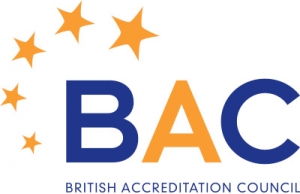Frequently Asked Questions
The BAC receives a large number of questions. These are the most frequent ones we have received so far.
BAC offers accreditation by an independent and well-established national body which is recognised in the UK and internationally. Our expert inspectors provide invaluable advice, and we support and advise our accredited colleges and act as a voice for the sector. Other benefits of BAC accreditation include the mark of quality, raising standards, keeping informed about developments in the sector, and eligibility to recruit international students on student visitor visas. Please click here for more information about the benefits of BAC accreditation.
If all the necessary documentation is completed accurately and submitted with the application form, an inspection will be arranged as soon as possible after the stage 1 (application) is completed. If there are any documents missing, or some of the documentation requires clarification or amendment, the process will be delayed. Once the application is signed off a suitable date and inspection team will be arranged, depending on the college’s schedule and provision. The report of that inspection is then submitted to the Accreditation Committee, which meets between four and six times a year. It is possible for a college to undergo an inspection within six weeks of submitting their application, and to attain accreditation within four months from the date of application, if everything is submitted accurately.
There is an initial application fee to cover the costs of processing the application and an inspection fee. Annual fees are charged once accreditation is awarded; these fees will be based on the number of students and the type of accreditation applied for. Please see our fees page for full details.
An awarding body validates or approves courses and qualifications. It may also administer examinations and assessments, and may provide students with certificates. BAC inspects and then accredits the college as a whole if it meets our standards.
Every institution is different. Some colleges enrol thousands of students, and some teach less than 100 per year. Some institutions teach a large range of different courses, and some focus entirely on one subject. Some follow a traditionally-structured academic year, while others provide short bespoke courses which can be only a few days in length. All of these institutions have very different needs and develop in different ways. For specialised, professional assistance with starting your institution, you may wish to consider our consultancy service.
Even if you have not started teaching we can inspect your institution and, if all standards are met, it will be awarded “Approved Candidate for Accreditation” status. We will then arrange a Stage 3 inspection within six months to observe teaching, learning and assessment and student welfare provision, as well the quality management procedures within the organisation. Students must be enrolled and present for the Stage 3 inspection. If this inspection is successful, the institution will be awarded full accreditation.
Yes. BAC is an approved body for the purpose of admitting student visitors. This immigration route applies to students on a course of study less than six months (26 weeks) in length. Please see the UKBA website here for more details.
You will need to be inspected and approved by an Educational Oversight body and undergo the Tier 4 application process with UKVI. Please see their guidance here for more information. If you would like assistance with reaching the required standards, you may wish to consider our consultancy service.
A short course provider is a training provider that runs courses of under 26 weeks in length. These providers are often very different from a traditional college and frequently focus on highly specialised professional development courses. Teaching may take place in premises owned or rented by the provider, or the provider may use external accommodation according to demand. BAC-accredited short course providers offer a huge range of subjects, including, but not limited to, aviation, oil and gas, telecommunications, NGO training and racehorse management.
BAC does not accredit institutions that teach only English language – these should apply to our sister body Accreditation UK (AUK), the accreditation arm of the British Council. If your college teaches other subjects in addition to English language and is already accredited by AUK, or is applying to AUK for accreditation of its English language provision, you may wish to consider joint accreditation; in this case BAC can carry out top-up inspections of AUK-accredited institutions.
Yes. BAC will accept applications from institutions teaching ESOL with Citizenship courses.
Please contact us to discuss accreditation of open and distance learning.
All students at accredited colleges may make a complaint to BAC regarding the college at which they are studying, providing that they can show that they have made reasonable efforts to resolve the matter using the college’s own complaints procedure before they contacted BAC, and providing that all other forms of appropriate documentary evidence are shown to be in place. The complaints process is an essential part of BAC’s quality assurance monitoring with regard to accredited colleges. It is very important that colleges respond within reasonable time to BAC’s contacts in respect of a student complaint, as this allows BAC to fully understand the college’s perspective on the issue, and to allow this perspective to inform any suggested resolution which BAC may put forwards. Should it not be possible for BAC to arrive at a resolution which is satisfactory to both parties, the matter may be referred to the Accreditation Committee. For more information on student complaints, please see section 7 of the Accreditation Handbook.
